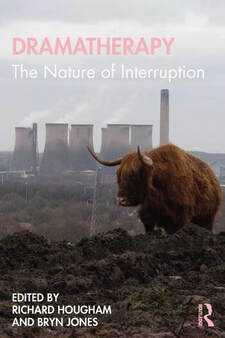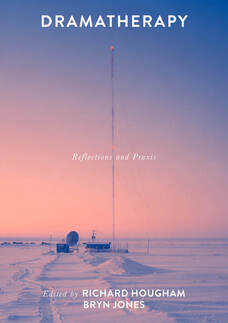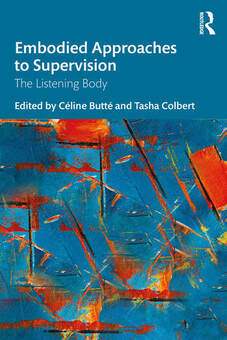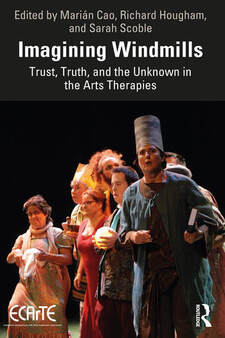
The Nature of Interruption investigates the nature and phenomena of interruption in ways that have relevance for contemporary dramatherapy practice. It is a timely contribution amidst an ‘age of interruption’ and examines how dramatherapists might respond with agency and discernment in personal, professional and cultural contexts. The writing gathers fresh ideas on how to conceptualise and utilise interruptions artistically, socially and politically. Individual chapters destabilise traditional conceptions of verbal and behavioural models of psychotherapy and offer a new vision based in the arts and philosophy.
The authors suggest that in the arts the unplanned or the interruptive can be the most arresting moment. They explore this hypothesis through examples presented by experienced dramatherapists, and through reference to significant writers, such as Jung and Levinas. The result is an intriguing, creative and original book that considers the causes and roots of interruptions in different contexts. A timely book, reflective, well-constructed and offering the reader the opportunity to consider in a new way the role of interruption in our daily lives. Diane Waller, Emeritus Professor of Art Psychotherapy, Goldsmiths University of London
Among the most interesting of edited books are those offering a specific theme that contributors, like jazz musicians, riff on, explore, and expand. This prescient volume weaves ancient and modern thought to capture dramatherapy’s potential for addressing the current moment, including reflections on living (and working) through a pandemic and welcome interrogations of therapeutic dogma. Readers will find grounding reminders and disruptively fresh ideas—a tension we need as we contemplate new horizons of practice. Craig Haen, Ph.D., Private Practitioner and Co-Founder of the Kint Institute
The authors suggest that in the arts the unplanned or the interruptive can be the most arresting moment. They explore this hypothesis through examples presented by experienced dramatherapists, and through reference to significant writers, such as Jung and Levinas. The result is an intriguing, creative and original book that considers the causes and roots of interruptions in different contexts. A timely book, reflective, well-constructed and offering the reader the opportunity to consider in a new way the role of interruption in our daily lives. Diane Waller, Emeritus Professor of Art Psychotherapy, Goldsmiths University of London
Among the most interesting of edited books are those offering a specific theme that contributors, like jazz musicians, riff on, explore, and expand. This prescient volume weaves ancient and modern thought to capture dramatherapy’s potential for addressing the current moment, including reflections on living (and working) through a pandemic and welcome interrogations of therapeutic dogma. Readers will find grounding reminders and disruptively fresh ideas—a tension we need as we contemplate new horizons of practice. Craig Haen, Ph.D., Private Practitioner and Co-Founder of the Kint Institute

Reflections and Praxis is both an accessible introduction and specialist review of contemporary dramatherapy practice today. The collected chapters introduce critical and cohesive perspectives on dramatherapy as it is being practiced, developed and advanced in diverse contexts.
The text unpicks the relationship between drama and therapy, exploring some of its key philosophies and practices, and examining its efficacy. Individual chapters investigate the connections between the discipline of dramatherapy both as an allied health profession, a form of psychotherapy and a traditional form of theatre and healing.
Contributors from a range of international backgrounds offer insight into and comparison between practices across the globe, drawing out universal and cultural concerns. Interdisciplinary and diverse in nature, Dramatherapy poses broad questions about the importance of the arts and arts therapies, making it a timely and crucial resource for students and practitioners alike.
This important book offers us diverse examples of contemporary dramatherapy praxis that reveal the power of play, symbolism, archetype, imagination and the sensing body in the therapeutic encounter whilst striving to support freedom, expression and social connectedness. Nisha Sajnani, Associate Professor, New York University, USA
The text unpicks the relationship between drama and therapy, exploring some of its key philosophies and practices, and examining its efficacy. Individual chapters investigate the connections between the discipline of dramatherapy both as an allied health profession, a form of psychotherapy and a traditional form of theatre and healing.
Contributors from a range of international backgrounds offer insight into and comparison between practices across the globe, drawing out universal and cultural concerns. Interdisciplinary and diverse in nature, Dramatherapy poses broad questions about the importance of the arts and arts therapies, making it a timely and crucial resource for students and practitioners alike.
This important book offers us diverse examples of contemporary dramatherapy praxis that reveal the power of play, symbolism, archetype, imagination and the sensing body in the therapeutic encounter whilst striving to support freedom, expression and social connectedness. Nisha Sajnani, Associate Professor, New York University, USA

Embodied Approaches to Supervision - The Listening Body presents innovative approaches to working with the body in supervision. The authors, who are all experts in their field, bring a wealth of experience and knowledge to each chapter.
The book offers reflections on the intimate and dynamic interaction between mind and body.
Chapter 3 - Multimodal and Liminal Perspectives (MLP); The Role of Liminality in the Dynamic of the Supervisory Relationship. In this chapter Bryn Jones describes a new supervisory method in which both projective and embodied processes are incorporated to deliver a richly textured and contextualised understanding of key themes. The chapter explains how the method offers both supervisee and supervisor an expansive framework where practice issues can be viewed from multiple perspectives.
The hybrid nature of this book reflects the increased interest in cross-modalities in supervision. It presents diverse approaches with the body as the site of reflection and containment. This rich collection of inspiring chapters makes a very valuable contribution. Helen Payne, Professor, PhD, ADMP & UKCP, Chair in Psychotherapy, University of Hertfordshire
The book offers reflections on the intimate and dynamic interaction between mind and body.
Chapter 3 - Multimodal and Liminal Perspectives (MLP); The Role of Liminality in the Dynamic of the Supervisory Relationship. In this chapter Bryn Jones describes a new supervisory method in which both projective and embodied processes are incorporated to deliver a richly textured and contextualised understanding of key themes. The chapter explains how the method offers both supervisee and supervisor an expansive framework where practice issues can be viewed from multiple perspectives.
The hybrid nature of this book reflects the increased interest in cross-modalities in supervision. It presents diverse approaches with the body as the site of reflection and containment. This rich collection of inspiring chapters makes a very valuable contribution. Helen Payne, Professor, PhD, ADMP & UKCP, Chair in Psychotherapy, University of Hertfordshire

Imagining Windmills - Trust, Truth and the Unknown in the Art Therapies presents a compilation of scholarly chapters by selected authors of global standing in the arts therapies. Writers combine to give an international voice to the book, which celebrates cultural distinctiveness, while also presenting shared intercultural developments. in the professions.
Chapter 4 - Dramatherapy and Materiality. In a keenly observed contribution, Hougham and Jones present a playful and searching analysis of ideas emerging from their collaborative practice. The writing is insightful as they test and examine themes of aesthetic sensibility, connection and the impact of using unorthodox materials in the therapeutic play space. Persuaded by the work of Peter Slade and Gaston Bachelard, this chapter jostles with fascinating questions and stirs with gentle curiosity.
This publication, as with previous ECArTE books generated from conferences, brings together international contributions. All are concerned with the innovative and ever-changing ideas within the arts therapies ... The authors destabilise monolithic structures of truth by looking out for what is truthful and mobilising the genius of creativity.
Chapter 4 - Dramatherapy and Materiality. In a keenly observed contribution, Hougham and Jones present a playful and searching analysis of ideas emerging from their collaborative practice. The writing is insightful as they test and examine themes of aesthetic sensibility, connection and the impact of using unorthodox materials in the therapeutic play space. Persuaded by the work of Peter Slade and Gaston Bachelard, this chapter jostles with fascinating questions and stirs with gentle curiosity.
This publication, as with previous ECArTE books generated from conferences, brings together international contributions. All are concerned with the innovative and ever-changing ideas within the arts therapies ... The authors destabilise monolithic structures of truth by looking out for what is truthful and mobilising the genius of creativity.
